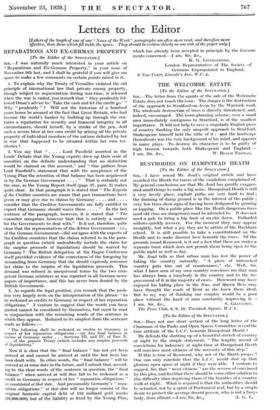Letters to the Editor
[Letters of the length of one of our "News of the Week" paragraphs are often m9re read, and therefore more effective, than those which fill treble the space. They should be written clearly on one side of the paper only.]
REPARATIONS AND EX-GERMAN PROPERTY
[To the Editor of the SPECTATOR.] SIR,—T was naturally much interested in your article on " Reparations and Ex-German Property," in your issue of November 9th last, and I shall be grateful if you will give me space to make a few comments on certain points raised in it.
1. To explain why the Treaty of Versailles violated the old principle of international law that private enemy property, though' subject to sequestration during war-time, is released when the war is ended, you remark that " they prudently fol- lowed Omar's advice to Take the cash and let the credit go.' " Why " prudently " ? Will not the historian of a hundred years hence be amazed at the fact that Great Britain, who had become the world's banker by building up through the cen- turies a reputation for security and financial integrity in all circumstances, should herself, by a stroke of the pen, deal such a severe blow at her own credit by seizing all the private property of individual members of the nations defeated by her in war that happened to be situated within her own ter- ritories ?
2. You say that " . . . . Lord Passfield asserted in the Lords' Debate that the Young experts drew up their scale of annuities on the definite understanding that no deduction would be claimed on this account," and " One gathers from Lord Passfield's statement that with the acceptance of the Young Plan the retention of that balance has been acquiesced in by the German Government . . . . " That is certainly not the case, as the Young Report itself (page 27, pars. 2) makes quite clear. In that paragraph it is stated that " The Experts of the Creditor countries are aware that past transactions have given or may give rise to claims by Germany . . . . and . . . . consider that the Creditor Governments are fully entitled to expect that Germany should waive them . . . . " In the last sentence of the paragraph, however, it is stated that The committee recognizes however that this is entirely a matter for the Governments to deal with." Is it not, therefore, quite clear that the representatives of the debtor Government—i.e., of the German Government—did not agree with the experts of the Creditor countries that the claims referred to in the para- graph in question (which undoubtedly include the claim for the surplus proceeds of liquidation) should be waived by Germany ? The British delegation at the Hague Conference itself provided evidence of the correctness of the foregoing by demanding from Germany that she should expressly renounce her claim to the surplus of the liquidation proceeds. This demand was refused in unequivocal terms by the two com- petent German ministers as was reported in all German news- papers of importance, and this has never been denied by the British Government.
3. As regards the legal position, you remark that the prob- lem very largely rests on the interpretation of the phrase to he reckoned as credits to Germany in respect of her reparation obligations." I venture to suggest that the words you have quoted cannot be considered by themselves, but must be read in conjunction with the remaining words of the sentence in which they appear. Reduced to its simplest form the sentence reads as follows :- " The following shall be reckoned as credits to Germany in respect of her reparation obligations :—(a) Any final balance in favour of Germany under . . . Sections III. and IV. of Part X.
• . . of the present Treaty (which includes any surplus proceeds of liquidation)."
Now it is clear that the " final balance " has not yet been arrived at and cannot be arrived at until the last item has been dealt with. In other words, the " final balance " will be arrived at at some date in the future, and I submit that, accord- ing to the clear words of the sentence in question, the " final balance " when arrived at will then fall to be reckoned as a credit to Germany in respect of her " reparation obligations " as constituted at that date. And presumably Germany's " repa- ration obligations" at that date will no longer consist of the original fantastic capital debt of 132 milliard gold marks (R9,800,000) but of the liability as fixed by the Young Plan, which has already been accepted in principle by the Govern- ments concerned.—I am, Sir, &c., K. G. LIVINGSTONE,






























































 Previous page
Previous page